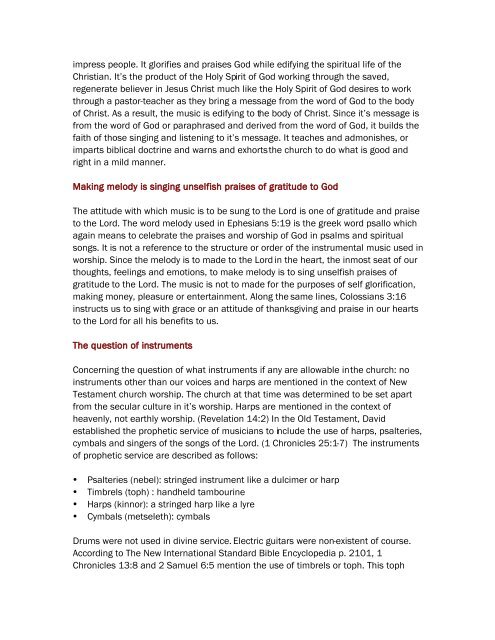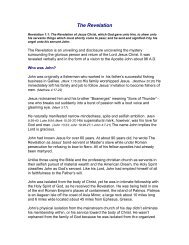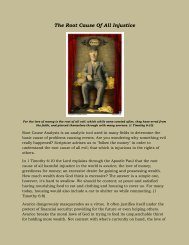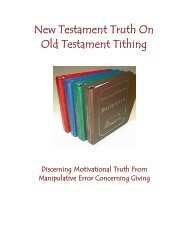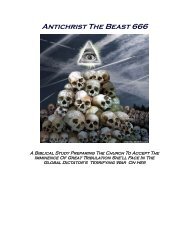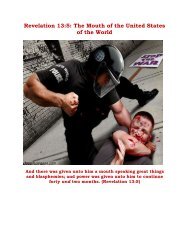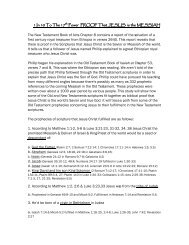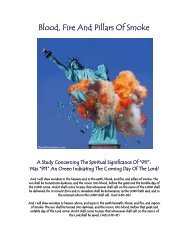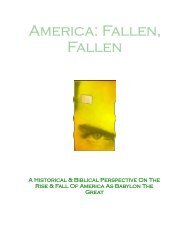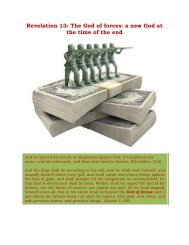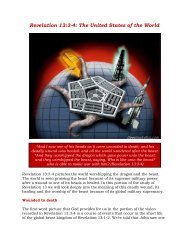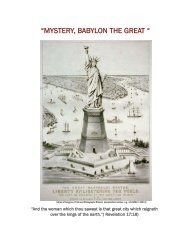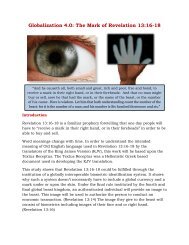the purpose driven music paradigm - Escape Babylon's Demons
the purpose driven music paradigm - Escape Babylon's Demons
the purpose driven music paradigm - Escape Babylon's Demons
Create successful ePaper yourself
Turn your PDF publications into a flip-book with our unique Google optimized e-Paper software.
impress people. It glorifies and praises God while edifying <strong>the</strong> spiritual life of <strong>the</strong><br />
Christian. It’s <strong>the</strong> product of <strong>the</strong> Holy Spirit of God working through <strong>the</strong> saved,<br />
regenerate believer in Jesus Christ much like <strong>the</strong> Holy Spirit of God desires to work<br />
through a pastor-teacher as <strong>the</strong>y bring a message from <strong>the</strong> word of God to <strong>the</strong> body<br />
of Christ. As a result, <strong>the</strong> <strong>music</strong> is edifying to <strong>the</strong> body of Christ. Since it’s message is<br />
from <strong>the</strong> word of God or paraphrased and derived from <strong>the</strong> word of God, it builds <strong>the</strong><br />
faith of those singing and listening to it’s message. It teaches and admonishes, or<br />
imparts biblical doctrine and warns and exhorts <strong>the</strong> church to do what is good and<br />
right in a mild manner.<br />
Making melody is singing unselfish praises of gratitude to God<br />
The attitude with which <strong>music</strong> is to be sung to <strong>the</strong> Lord is one of gratitude and praise<br />
to <strong>the</strong> Lord. The word melody used in Ephesians 5:19 is <strong>the</strong> greek word psallo which<br />
again means to celebrate <strong>the</strong> praises and worship of God in psalms and spiritual<br />
songs. It is not a reference to <strong>the</strong> structure or order of <strong>the</strong> instrumental <strong>music</strong> used in<br />
worship. Since <strong>the</strong> melody is to made to <strong>the</strong> Lord in <strong>the</strong> heart, <strong>the</strong> inmost seat of our<br />
thoughts, feelings and emotions, to make melody is to sing unselfish praises of<br />
gratitude to <strong>the</strong> Lord. The <strong>music</strong> is not to made for <strong>the</strong> <strong>purpose</strong>s of self glorification,<br />
making money, pleasure or entertainment. Along <strong>the</strong> same lines, Colossians 3:16<br />
instructs us to sing with grace or an attitude of thanksgiving and praise in our hearts<br />
to <strong>the</strong> Lord for all his benefits to us.<br />
The question of instruments<br />
Concerning <strong>the</strong> question of what instruments if any are allowable in <strong>the</strong> church: no<br />
instruments o<strong>the</strong>r than our voices and harps are mentioned in <strong>the</strong> context of New<br />
Testament church worship. The church at that time was determined to be set apart<br />
from <strong>the</strong> secular culture in it’s worship. Harps are mentioned in <strong>the</strong> context of<br />
heavenly, not earthly worship. (Revelation 14:2) In <strong>the</strong> Old Testament, David<br />
established <strong>the</strong> prophetic service of <strong>music</strong>ians to include <strong>the</strong> use of harps, psalteries,<br />
cymbals and singers of <strong>the</strong> songs of <strong>the</strong> Lord. (1 Chronicles 25:1-7) The instruments<br />
of prophetic service are described as follows:<br />
Psalteries (nebel): stringed instrument like a dulcimer or harp<br />
Timbrels (toph) : handheld tambourine<br />
Harps (kinnor): a stringed harp like a lyre<br />
Cymbals (metseleth): cymbals<br />
Drums were not used in divine service. Electric guitars were non-existent of course.<br />
According to The New International Standard Bible Encyclopedia p. 2101, 1<br />
Chronicles 13:8 and 2 Samuel 6:5 mention <strong>the</strong> use of timbrels or toph. This toph


